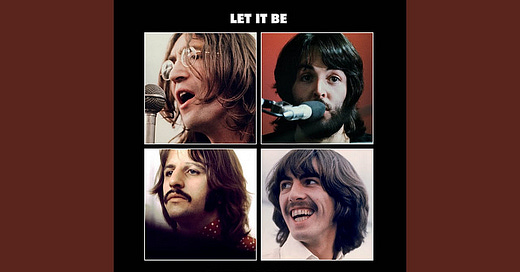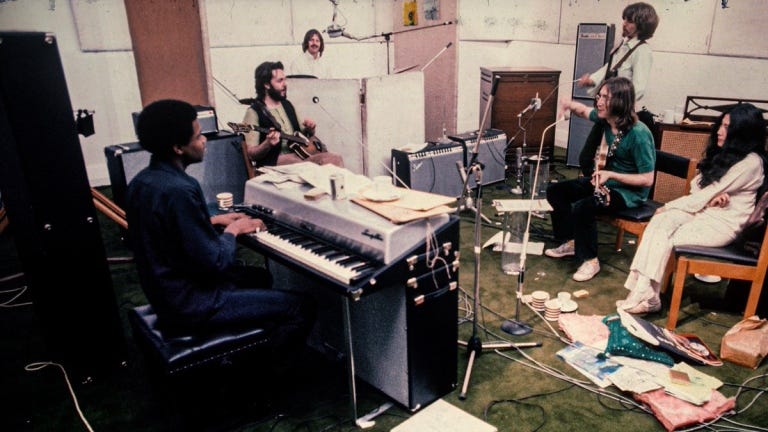Yet another take on The Beatles and Peter Jackson's "Get Back"
I came into Thanksgiving with enthusiasm to spare for Get Back, the Beatles documentary that streamed on three consecutive nights beginning on the traditional Thursday feasting day. I left the weekend with a sense of having learned a number of things but also with my senses a bit dulled by the onslaught of candid footage.
There is so much that is incredible and that we have never seen before, but the final analysis, for me, is that while things were a bit different than was often portrayed in the media and in the final Let It Be film itself, the story line is much the same. Paul McCartney did try to keep the group together as a going concern and that was always going to be at the expense of some of his friendship with the others. John Lennon and George Harrison weren't committed to being there nor to the film/live performance project. Yoko didn't do anything all that weird or disruptive other than the argument over whether she should have been there in the first place. Ringo did Ringo, as he always did.
There's a consensus emerging that Paul was underappreciated and unduly vilified for things that are not on display in Get Back. But Let It Be has been out of circulation for many years, and so there are various accounts, verified and unverified, from people who were there at the time and the written archive of interviews and stories, often in long out of print music rags. We don't know what Peter Jackson left on the cutting room floor, what his frame includes and doesn't include. Michael Lindsey-Hogg left George Harrison's three day hiatus from The Beatles out of Let It Be at the band's request. Jackson chose to restore that narrative because, hey, it seems like it might be somewhat important in the overall scheme of things.
There's a scene about two thirds of the way through Part 2 where Paul talks about having looked at his home movies taken during the group's 1968 trip to Rishikesh, India. After some comments punctuated by the actual footage he's talking about, he and John exchange knowing looks and lament that they should have been 'more themselves,' bristling at having been pulled into what seemed like a classroom with them in a submissive position as students to the great Maharishi. Harrison laughs and says he finds it the height of ridiculousness to hear his friends speak of 'being themselves' when the goal of the trip was to help find out who they really were, something that conventional Western society seeks to obscure.
That scene demonstrated that they would never truly have Harrison back, even though he was there for the moment. John and Paul couldn't help seeing him as the acolyte, and he had outgrown the role.
Like some others who have listened to the reissued album deluxe set, I find myself drawn to the mix completed by Glyn Johns under intense pressure because he had another scheduled gig, a mix that was rejected by the Beatles as being a bit too informal and rough cut. Which it is, but as others have pointed out, it's nothing out of the ordinary in this age of deluxe editions full of remixes and mixtapes. The only drawback is that you get some unfinished takes when there were better ones to be had, or you get abrupt cutoffs so that you end up with an abbreviated version of "I've Got A Feeling" but there is a lengthy, pointless four minutes of the jam "Dig It." But he does a terrific job with "Let It Be", and we get to hear Billy Preston's organ more clearly. Both "Long and Winding Road" and "Across The Universe" are better without the Phil Spector post-production strings they eventually garnered. George's tracks, "I Me Mine" and "For You Blue" are also improved, with the former bristling with energy and the latter getting a nice Basement Tapes-style country blues arrangement.
One thing that Get Back did really well was demonstrate the process of writing songs, of learning them and rehearsing them and hashing out arrangements, which is something that all bands do even if they aren't recording live in the studio with no overdubs. Seeing inspiration come to Paul as he breathes life into the frailest conception of "Get Back" is truly something that most people have never seen--the moment a creative spark takes hold. But it takes a lot of work from there to the finished product, a single of the song that The Beatles release while still recording Let It Be--their first single in five months, we are told.
The Beatles were always a singles band, but they made themselves an album band. In fact they, along with a handful of other sixties groups, created the very idea of an album band. Still, the Top of the Charts standards of the era still applied to The Beatles, and perhaps this is what doomed Let It Be to always be 'less than,' neither fish nor fowl in relation to the group's recorded canon. Even as they sought to break out of doing the 'same old shit' (McCartney's words) they were constrained by their background as a pop phenomenon and their place in the pop firmament. Paul is fiercely competitive and considers writers like Brian Wilson to be his competition. In 1969 you've got to have singles at regular intervals to maintain your street creds, and it's a highly competitive game. Paul shows up with a new acetate, Jagger has a tape of the Stones latest, someone has a bootleg of Music From Big Pink. By this time, of course, Dylan has abandoned the trappings of the pop marketplace, a fact that can't be lost on the group, particularly John and George.
With the Get Back Sessions, The Beatles started out to make a 'fireside' album, one that partially exploded the myth of The Beatles by showing them in the process of creating--a theme that Peter Jackson takes up admirably--but in the end they succumbed to the pressures of the marketplace, bringing in a high profile producer (Spector) who essentially added string arrangements to a couple of songs. The result was that they went back into the studio and cut Abbey Road with George Martin, and got it released before the final Let It Be record was. ready. There's no question that Abbey Road was the Beatles funeral that Paul McCartney wanted, and maybe they all did at that point, but Let It Be is the more honest record, and it ushered in a lot of the sound and feel that the band members would take forward into their solo careers, and which partially became the predominant rock sound of the early to mid seventies. The original album release carried the inscription:
"This is a new phase BEATLES album...essential to the content of the film, LET IT BE was that they performed live for many of the tracks; in comes the warmth and the freshness of a live performance, as reproduced for record by Phil Spector."
But if you listen to the Glyn Johns mix you realize that it is precisely the warmth and freshness gained by all four (five) of The Beatles playing simultaneously that was eventually strangled out of the record. I don't blame Phil Spector, he did the job that he was hired to do, which was to pull together an acceptable Beatles record to be their final release. It would have been commercial suicide to release the Glyn Johns mix as is, but what better time to do something completely outside the pop music box than when you are about to call it quits? In the end, it was ego that prevented such a move, which would have been seen as the group falling apart not only in terms of personal relationships, but also professionally.
Get Back is a great accomplishment and a great piece of work for future historians of the music, but for this huge Beatles fan it was a little too much to take in all at once. I will listen to the deluxe CD edition of Let It Be over and over, but I doubt I will ever sit through Get Back in its entirety again (but I'm sure I'll watch parts again from time to time). I feel as though Jackson could have articulated his main themes in half the time, but there's no question it would have left out a lot of fascinating footage. Ultimately, this was the documentary that the Get Back sessions deserved and have never previously gotten.
Thanks as always for reading and sharing my newsletter. Working on some good stuff this month, hope to share with you soon. Boosted publication schedule coming in 2022.



